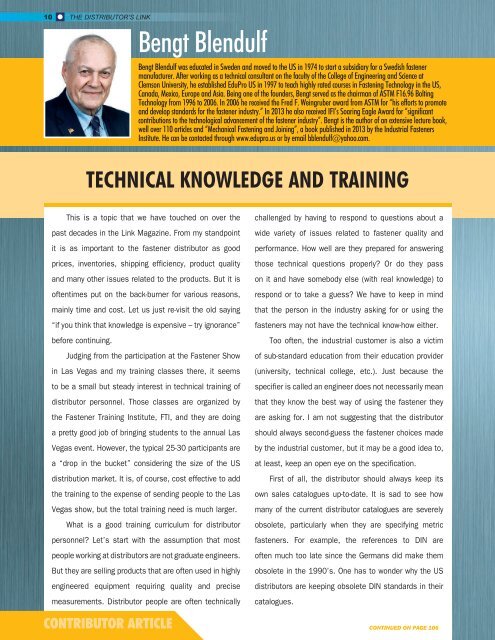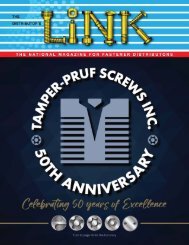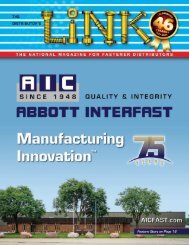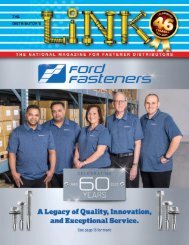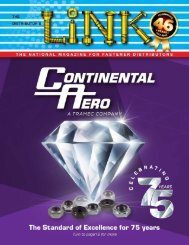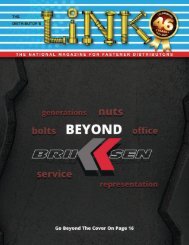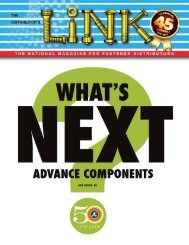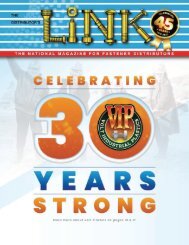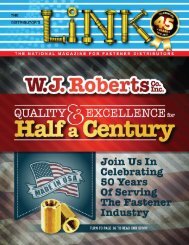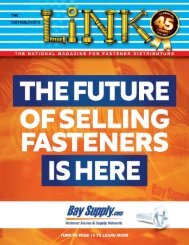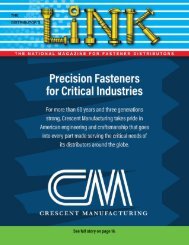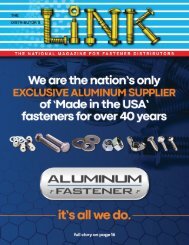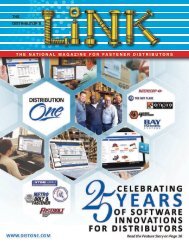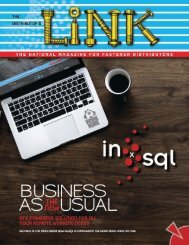SPRING 2017
Distributor's Link Magazine Spring Issue 2017 / Vol 40 No2
Distributor's Link Magazine Spring Issue 2017 / Vol 40 No2
You also want an ePaper? Increase the reach of your titles
YUMPU automatically turns print PDFs into web optimized ePapers that Google loves.
10<br />
THE DISTRIBUTOR’S LINK<br />
Bengt Blendulf<br />
Bengt Blendulf was educated in Sweden and moved to the US in 1974 to start a subsidiary for a Swedish fastener<br />
manufacturer. After working as a technical consultant on the faculty of the College of Engineering and Science at<br />
Clemson University, he established EduPro US in 1997 to teach highly rated courses in Fastening Technology in the US,<br />
Canada, Mexico, Europe and Asia. Being one of the founders, Bengt served as the chairman of ASTM F16.96 Bolting<br />
Technology from 1996 to 2006. In 2006 he received the Fred F. Weingruber award from ASTM for “his efforts to promote<br />
and develop standards for the fastener industry.” In 2013 he also received IFI’s Soaring Eagle Award for “significant<br />
contributions to the technological advancement of the fastener industry”. Bengt is the author of an extensive lecture book,<br />
well over 110 articles and “Mechanical Fastening and Joining”, a book published in 2013 by the Industrial Fasteners<br />
Institute. He can be contacted through www.edupro.us or by email bblendulf@yahoo.com.<br />
TECHNICAL KNOWLEDGE AND TRAINING<br />
This is a topic that we have touched on over the<br />
past decades in the Link Magazine. From my standpoint<br />
it is as important to the fastener distributor as good<br />
prices, inventories, shipping efficiency, product quality<br />
and many other issues related to the products. But it is<br />
oftentimes put on the back-burner for various reasons,<br />
mainly time and cost. Let us just re-visit the old saying<br />
“if you think that knowledge is expensive – try ignorance”<br />
before continuing.<br />
Judging from the participation at the Fastener Show<br />
in Las Vegas and my training classes there, it seems<br />
to be a small but steady interest in technical training of<br />
distributor personnel. Those classes are organized by<br />
the Fastener Training Institute, FTI, and they are doing<br />
a pretty good job of bringing students to the annual Las<br />
Vegas event. However, the typical 25-30 participants are<br />
a “drop in the bucket” considering the size of the US<br />
distribution market. It is, of course, cost effective to add<br />
the training to the expense of sending people to the Las<br />
Vegas show, but the total training need is much larger.<br />
What is a good training curriculum for distributor<br />
personnel? Let’s start with the assumption that most<br />
people working at distributors are not graduate engineers.<br />
But they are selling products that are often used in highly<br />
engineered equipment requiring quality and precise<br />
measurements. Distributor people are often technically<br />
CONTRIBUTOR ARTICLE<br />
challenged by having to respond to questions about a<br />
wide variety of issues related to fastener quality and<br />
performance. How well are they prepared for answering<br />
those technical questions properly? Or do they pass<br />
on it and have somebody else (with real knowledge) to<br />
respond or to take a guess? We have to keep in mind<br />
that the person in the industry asking for or using the<br />
fasteners may not have the technical know-how either.<br />
Too often, the industrial customer is also a victim<br />
of sub-standard education from their education provider<br />
(university, technical college, etc.). Just because the<br />
specifier is called an engineer does not necessarily mean<br />
that they know the best way of using the fastener they<br />
are asking for. I am not suggesting that the distributor<br />
should always second-guess the fastener choices made<br />
by the industrial customer, but it may be a good idea to,<br />
at least, keep an open eye on the specification.<br />
First of all, the distributor should always keep its<br />
own sales catalogues up-to-date. It is sad to see how<br />
many of the current distributor catalogues are severely<br />
obsolete, particularly when they are specifying metric<br />
fasteners. For example, the references to DIN are<br />
often much too late since the Germans did make them<br />
obsolete in the 1990’s. One has to wonder why the US<br />
distributors are keeping obsolete DIN standards in their<br />
catalogues.<br />
CONTINUED ON PAGE 106


